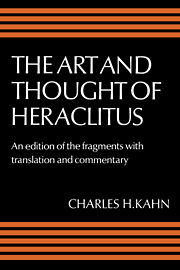 The Art and Thought of Heraclitus
The Art and Thought of Heraclitus Book contents
- Frontmatter
- Contents
- Preface
- Dedication
- Bibliography and abbreviations
- General introduction
- Introductory note to text and translation
- The fragments
- On reading Heraclitus
- Commentary on the fragments
- Appendices
- I Dubious quotations from Heraclitus
- II Doxographic reports
- III Heraclitus and the Orient, apropos of a recent book by M.L. West
- Notes
- Concordances
- Indexes
III - Heraclitus and the Orient, apropos of a recent book by M.L. West
Published online by Cambridge University Press: 26 February 2010
- Frontmatter
- Contents
- Preface
- Dedication
- Bibliography and abbreviations
- General introduction
- Introductory note to text and translation
- The fragments
- On reading Heraclitus
- Commentary on the fragments
- Appendices
- I Dubious quotations from Heraclitus
- II Doxographic reports
- III Heraclitus and the Orient, apropos of a recent book by M.L. West
- Notes
- Concordances
- Indexes
Summary
Three out of the seven chapters in West's Early Greek Philosophy and the Orient (Oxford, 1971) are devoted to Heraclitus. The question is, as he says, a ‘perpetual’ one: proposed in antiquity by the forged correspondence between Heraclitus and Darius, reopened early in the nineteenth century by Schleiermacher and Creuzer, it is unlikely to be closed soon. Scholarly fashions may come and go, but here there is a genuine problem that will remain. In the case of Heraclitus more clearly than for any other author of early Greece, we can find striking textual parallels with the half-mythic, half-philosophic speculation of ancient India and Iran. I take this much to have been established by West and by the scholars who preceded him in this line of comparative research.
Individual scholars may disagree on whether any particular item belongs on the list of significant parallels. For example, I am not convinced that the points of correspondence between the story of Heraclitus' death and the Persian purification rite that West describes are ‘too striking to be fortuitous’ (West, p. 200); nor do I believe that a Hellenistic story can be used as evidence for Persian influence in the earlier period. On the other side of the ledger, West dismisses the usual parallel to an Iranian judgment by fire (p. 170), because he follows Reinhardt in rejecting CXXI (D. 66) as inauthentic (p. 114, n. 1). Since I accept the fragment in question, this point of similarity will belong on my list but not on West's.
- Type
- Chapter
- Information
- The Art and Thought of HeraclitusA New Arrangement and Translation of the Fragments with Literary and Philosophical Commentary, pp. 297 - 302Publisher: Cambridge University PressPrint publication year: 1979


